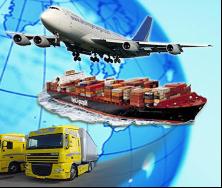
The shipping industry has been sailing through troubled seas as the global recession takes a toll on trade, but Asian shipping stocks have rebounded in 2009 as investors bet on a recovery.
China COSCO, the mainland's top shipper and operator of the world's biggest dry bulk fleet, hit an eight-month intra-day high on Wednesday on the strength of dry bulk shipping rates, and is up about 65 percent this year.
The Baltic Exchange's main sea freight index, which tracks rates to ship resources including iron ore, coal, cement, grain and fertilizer, rose 14 straight days to 2,665 points yesterday, a fresh year high and four times its December low.
Container ship operators that are now losing money on overcapacity and weak demand have rallied even stronger, with China Shipping Container Lines and OOIL up 85 and 77 percent this year.
Goldman Sachs upgraded its container ship stance to attractive from neutral, saying the sector is trading at a deep discount. It raised Taiwan's Evergreen Marine and Wan Hai Lines and Korea's Hanjin shipping to "buy" from "neutral" and reiterated its buy for China Shipping Container Lines.
"Japan and Korea shipping stocks have also underperformed China's shipping sector even though the industry drivers are global," it said. Goldman also upgraded Mitsui O.S.K. Lines to buy from neutral.
The container shipping company sector currently is trading at an average of 0.7 times to 2009 book value against an historical range of between 0.3 to 3 times. The mid-cycle valuation is around 1.2 times for shipping firms but it should trade at a discount in the current market, analysts said.
Dry bulk freight rates should rise further at least in the short term with China's 4 trillion yuan stimulus package, which will lead to increased infrastructure spending.
The mainland's stocking of cheap imported iron ore ahead of the annual sales agreement between its domestic steel makers and Australian miners has boosted dry bulk freight rates, but prices could drop once the stocking process ends.
Dry bulk shipping firms are still operating at losses, and the current valuations of shipping firms do not offer a meaningful upside, said Maggie Lee, an Invesco director who manages $2.5 billion under the Invesco Asia Infrastructure Fund.
The sector is trading at an average of 0.9 times book value compared with a range of 0.6 times to 6 times.